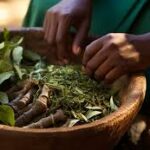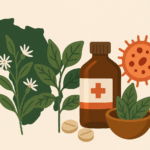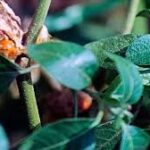African Herbs for Treating Malaria: What Science Says

Malaria remains one of Africa’s deadliest diseases, claiming hundreds of thousands of lives every year, especially among children under five. Despite the availability of modern treatments, many communities still rely on African herbs for malaria treatment due to affordability, accessibility, and cultural acceptance.
But the critical question is: what does science say about these herbal remedies? Research shows that while some herbs are effective and even form the foundation of modern anti-malaria drugs, others lack sufficient evidence. This article explores the most common African herbs used for malaria, their scientific backing, and the future of herbal medicine in the fight against malaria.
Common African Herbs for Malaria
1. Artemisia annua (Sweet Wormwood)
-
Scientific Evidence: Artemisinin, derived from this plant, is the basis for the world’s most effective malaria treatment — Artemisinin-based Combination Therapies (ACTs).
-
Impact: This discovery won the Nobel Prize in Medicine in 2015, proving how traditional herbs can revolutionize modern medicine.
2. Neem (Azadirachta indica)
-
Traditional Use: Widely used in Nigeria and India to reduce fever and kill parasites.
-
Research Findings: Some studies confirm neem has anti-parasitic properties, though results are inconsistent and dosage is not standardized.
3. Moringa oleifera
-
Traditional Use: Known as the “miracle tree,” moringa is used to boost immunity and support recovery from malaria.
-
Scientific Evidence: While not a direct cure, moringa’s antioxidant and nutritional properties help patients regain strength after infection.
4. Cinchona bark
-
Historical Impact: This South American plant, later introduced into Africa, was the source of quinine, one of the first anti-malaria drugs.
-
Relevance: Its success paved the way for modern malaria drug development.
5. Vernonia amygdalina (Bitter Leaf)
-
Traditional Use: Common in West Africa as a natural remedy for fever and malaria symptoms.
-
Research Findings: Preliminary studies show it has anti-plasmodial properties, but more clinical trials are needed.
Why Africans Still Rely on Herbal Remedies for Malaria
-
Accessibility – Herbs grow locally and are easy to obtain.
-
Affordability – Many rural families cannot afford modern antimalarial drugs.
-
Cultural Beliefs – Herbal medicine is trusted across generations.
-
Resistance Concerns – With rising drug resistance, communities seek alternatives.
What Science Says About Effectiveness
-
Proven Herbs: Artemisia annua (artemisinin) has global scientific validation.
-
Promising Herbs: Neem, bitter leaf, and moringa show potential but require more controlled trials.
-
Unproven Remedies: Some herbs may only relieve symptoms rather than cure malaria.
Challenges in Using Herbs for Malaria
-
Lack of Standardization – Dosages vary widely, leading to under-treatment or toxicity.
-
Drug-Herb Interactions – Using herbs alongside ACTs can reduce drug effectiveness.
-
Counterfeit Herbal Products – Poor regulation leads to unsafe formulations.
-
Insufficient Clinical Trials – Most herbs lack the rigorous scientific testing required for approval.
The Future of Malaria Treatment in Africa
To fully harness herbal medicine in malaria control, several steps are necessary:
-
Increased Research: Invest in large-scale clinical trials.
-
Regulation: Standardize herbal products to ensure safety.
-
Integration: Encourage collaboration between traditional healers and modern health systems.
-
Public Education: Raise awareness about safe herbal use and when to seek hospital care.
Conclusion
African herbs have played, and continue to play, a major role in the fight against malaria. From quinine to artemisinin, history shows that traditional medicine can transform into modern life-saving drugs. While some herbs are scientifically validated, others need more research before they can be widely recommended.
The future lies in integrating herbs and modern medicine — combining Africa’s natural resources with scientific innovation. By doing so, Africa can lead a new chapter in the global war against malaria.
Written by Fawzi Rufai, Medically Reviewed by Sesan Kareem



